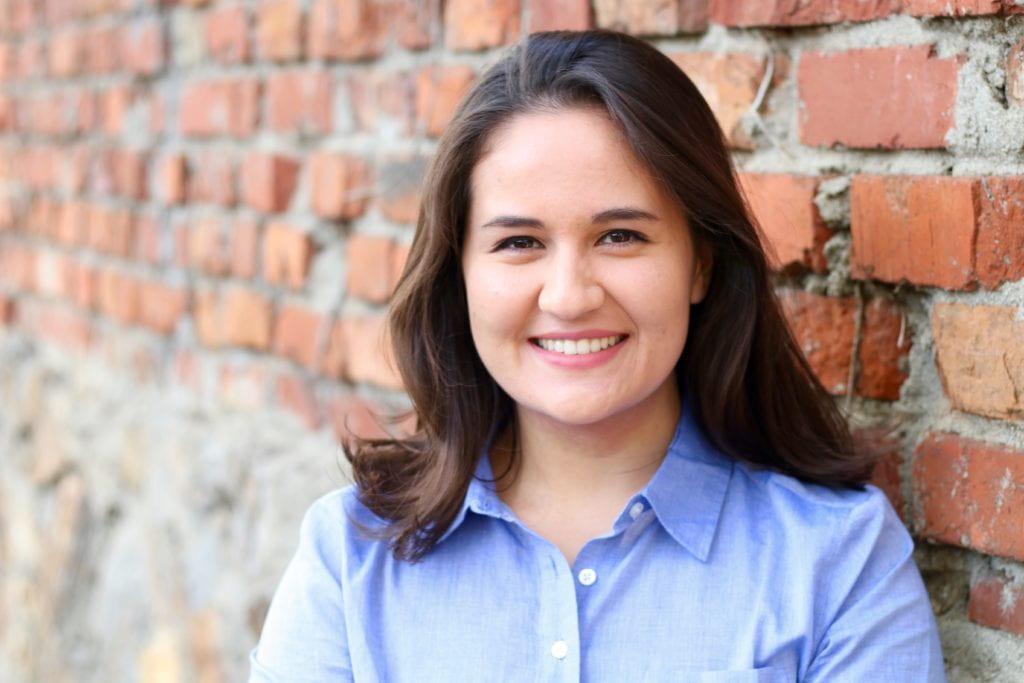
- Name: Saya Jenks
- Pronouns: She/Her/Hers
- Where I’m from: Menlo Park, CA
- Program at NYU: I’m pursuing an MA in Educational Theatre at NYU Steinhardt.
- Before NYU… I was teaching at a progressive PreK-12 school in the Bay Area called The Nueva School. Before that, I was an undergrad at Stanford, where I majored in Comparative Studies in Race and Ethnicity.
How and why did you decide to get involved with VPL?
When I attended VPL’s performance of The Kavanaugh Files last fall, I knew I wanted to explore this style of performance because of the discomfort it engendered in me as an audience member. The Kavanaugh Files explores the role that gender plays in our perceptions of Justice Kavanaugh’s confirmation by flipping the genders of key players in that trial: e.g. Lindsey Graham and Brett Kavanaugh were played by female-presenting actors, and Dr. Christine Blasey-Ford was played by a male-presenting actor. I found myself unsettled by my reactions. For example, I found myself thinking that had I come in not knowing anything about Sen. Graham, I might have thought “she” was admirably assertive woman in charge! The performance also made me angry, because Suzy Jane Hunt’s performance as Kavanaugh made it so evident that our society never would have tolerated a woman angrily sniveling and whining her way through a trial for such an esteemed position. That performance made me think, this style of acting had such a profound impact on me as an audience member… What would it be like to be on the other side as an actor?
What VPL projects are you working on?
At the time of writing, I am two days away from opening Making Gay History: Before Stonewall, the spring mainstage show for NYU Steinhardt’s Educational Theatre program. VPL Director Joe Salvatore is directing Making Gay History: Before Stonewall and is employing verbatim techniques in the performance. This is the first time I’ve performed in a verbatim theatre piece, or really any kind of ethnodrama. I’m playing two characters whose voices are very different from one another, and I have loved the challenge of weaving in and out of those roles. This technique feels to me like what I’ve been calling “acting backwards.” Usually, I start a process with table work to find my character’s objectives, obstacles, etc., and let that dictate what happens to my body and voice. But with verbatim theatre, we move in the opposite direction: we memorize exactly what our characters sound like first, working to match their breath, prosody, and volume, and then use those aural cues to figure out how they may have been feeling.
The show is inspired by interviews with members of the LGBTQ+ community in the time leading up to the protest at the Stonewall Inn; these interviews were collected between 1980-1990 in a book (and later a podcast) called Making Gay History by a journalist named Eric Marcus. Unfortunately, most of the people Marcus interviewed have died, and video only exists of a few of the people we are playing. However, we have had the privilege of getting to mine Marcus’ memory for how these people he interviewed held themselves, what kinds of gestures they used, etc. The process of putting on this play has therefore sparked many discussions with the cast and creative team about the nature of memory. We are working off of one person’s memory of a person whom he may have only spent a few hours with 25 years ago. On top of that, his interview subjects (our characters) are recalling events that transpired 40 years before their interviews. So although our vocal choices are verbatim, our physical choices have to be just that – choices on our part.
How do you hope to incorporate verbatim performance into your future work?
I am a teaching artist and hope to continue working in schools after I graduate from NYU. VPL’s work has had a powerful impact on the way I am able to notice how aspects of identity such as gender or race affect my perceptions of people and events. I therefore want to introduce VPL’s online resources, such as the “Guess the Candidate” game or the filmed versions of The Serena Williams Project or The Kavanaugh Files as a teaching tool into my classrooms.
